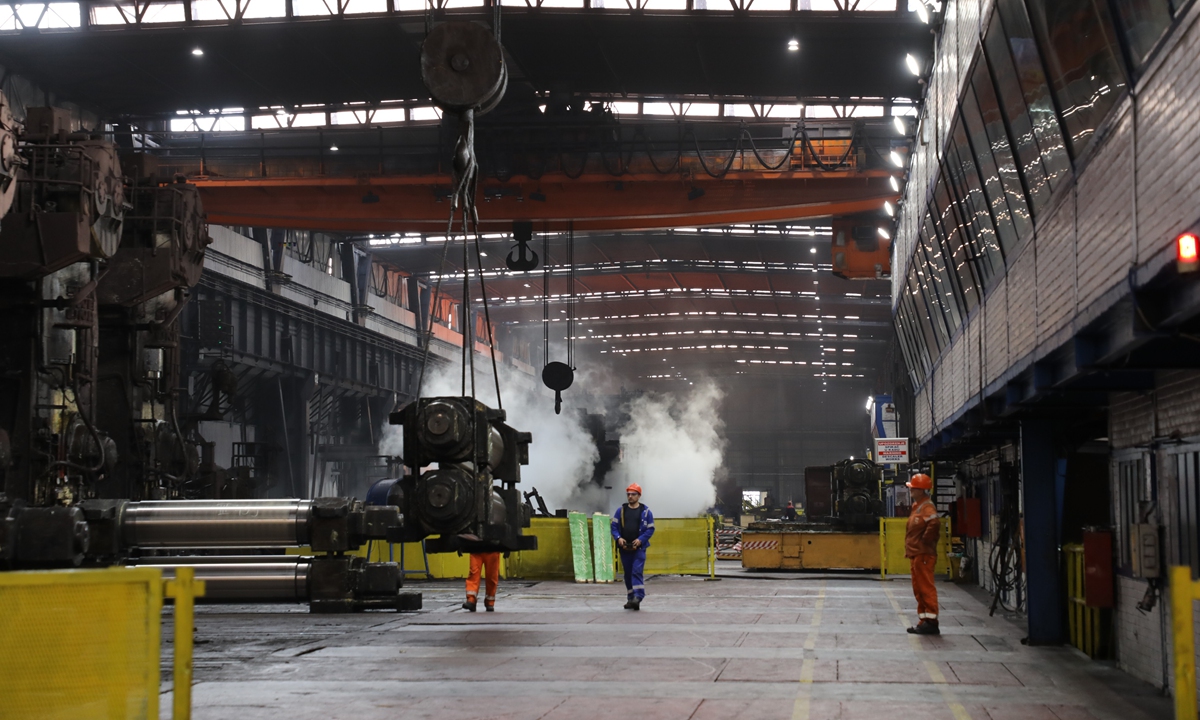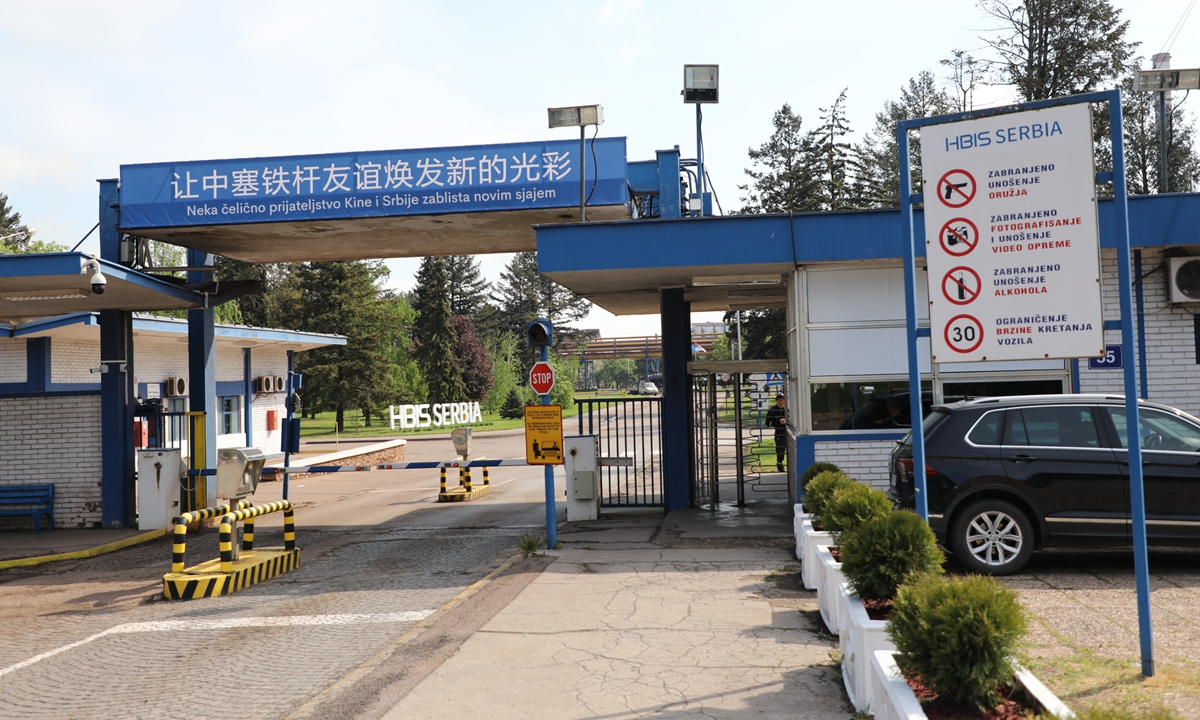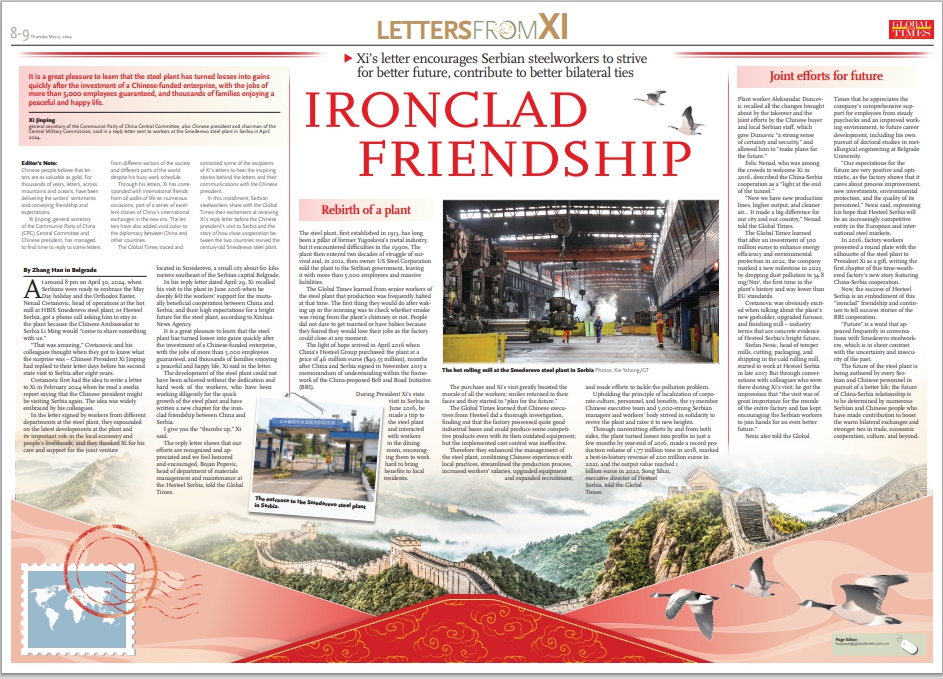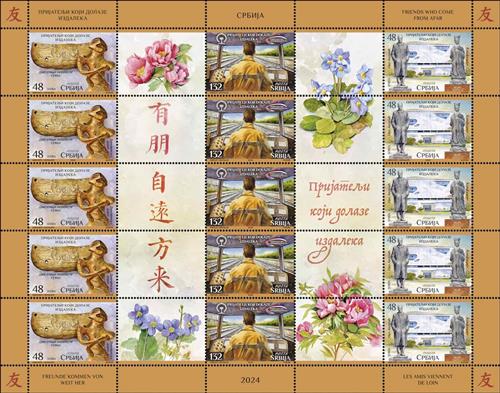IN-DEPTH / IN-DEPTH
Xi’s letter encourages Serbian steelworkers to strive for better future, contribute to better bilateral ties
Ironclad friendship
Editor's Note:
Chinese people believe that letters are as valuable as gold. For thousands of years, letters, across mountains and oceans, have been delivering the writers' sentiments and conveying friendship and expectations.
Xi Jinping, general secretary of the Communist Party of China (CPC) Central Committee and Chinese president, has managed to find time to reply to some letters from different sectors of the society and different parts of the world despite his busy work schedule.
Through his letters, Xi has corresponded with international friends from all walks of life on numerous occasions, part of a series of excellent stories of China's international exchanges in the new era. The letters have also added vivid color to the diplomacy between China and other countries.
The Global Times traced and contacted some of the recipients of Xi's letters to hear the inspiring stories behind the letters and their communications with the Chinese president.
In this installment, Serbian steelworkers share with the Global Times their excitement at receiving Xi's reply letter before the Chinese president's visit to Serbia and the story of how close cooperation between the two countries revived the century-old Smederevo steel plant.

At around 8 pm on April 30, 2024, when Serbians were ready to embrace the May Day holiday and the Orthodox Easter, Nenad Cvetanovic, head of operations at the hot mill at HBIS Smederevo steel plant, or Hesteel Serbia, got a phone call asking him to stay in the plant because the Chinese Ambassador to Serbia Li Ming would "come to share something with us."
"That was amazing," Cvetanovic and his colleagues thought when they got to know what the surprise was - Chinese President Xi Jinping had replied to their letter days before his second state visit to Serbia after eight years.
Cvetanovic first had the idea to write a letter to Xi in February 2024 when he read a media report saying that the Chinese president might be visiting Serbia again. The idea was widely embraced by his colleagues.
In the letter signed by workers from different departments at the steel plant, they expounded on the latest developments at the plant and its important role in the local economy and people's livelihoods, and they thanked Xi for his care and support for the joint venture located in Smederevo, a small city about 60 kilometers southeast of the Serbian capital Belgrade.
In his reply letter dated April 29, Xi recalled his visit to the plant in June 2016 when he deeply felt the workers' support for the mutually beneficial cooperation between China and Serbia, and their high expectations for a bright future for the steel plant, according to Xinhua News Agency.
It is a great pleasure to learn that the steel plant has turned losses into gains quickly after the investment of a Chinese-funded enterprise, with the jobs of more than 5,000 employees guaranteed, and thousands of families enjoying a peaceful and happy life, Xi said in the letter.
The development of the steel plant could not have been achieved without the dedication and hard work of the workers, who have been working diligently for the quick growth of the steel plant and have written a new chapter for the iron-clad friendship between China and Serbia.
I give you the "thumbs up," Xi said.
The reply letter shows that our efforts are recognized and appreciated and we feel honored and encouraged, Bojan Popovic, head of department of materials management and maintenance at the Hesteel Serbia, told the Global Times.
"It reinforced our belief that the strong bond between China and Serbia is built on the efforts of ordinary workers like us," Popovic said. "We are proud to be part of this partnership and to contribute to the growth and success of our steel plant, and thus, to the development and strengthening of our economic ties."

Rebirth of a plant
The steel plant, first established in 1913, has long been a pillar of former Yugoslavia's metal industry, but it encountered difficulties in the 1990s. The plant then entered two decades of struggle of survival and, in 2012, then owner US Steel Corporation sold the plant to the Serbian government, leaving it with more than 5,000 employees and massive liabilities.
The Global Times learned from senior workers of the steel plant that production was frequently halted at that time. The first thing they would do after waking up in the morning was to check whether smoke was rising from the plant's chimney or not. People did not dare to get married or have babies because they feared they would lose their jobs as the factory could close at any moment.
The light of hope arrived in April 2016 when China's Hesteel Group purchased the plant at a price of 46 million euros ($49.55 million), months after China and Serbia signed in November 2015 a memorandum of understanding within the framework of the China-proposed Belt and Road Initiative (BRI).
During President Xi's state visit to Serbia in June 2016, he made a trip to the steel plant and interacted with workers in the dining room, encouraging them to work hard to bring benefits to local residents.
The purchase and Xi's visit greatly boosted the morale of all the workers; smiles returned to their faces and they started to "plan for the future."
The Global Times learned that Chinese executives from Hesteel did a thorough investigation, finding out that the factory possessed quite good industrial bases and could produce some competitive products even with its then outdated equipment; but the implemented cost control was ineffective.
Therefore they enhanced the management of the steel plant, combining Chinese experience with local practices, streamlined the production process, increased workers' salaries, upgraded equipment and expanded recruitment, and made efforts to tackle the pollution problem.
Upholding the principle of localization of corporate culture, personnel, and benefits, the 13-member Chinese executive team and 5,000-strong Serbian managers and workers' body strived in solidarity to revive the plant and raise it to new heights.
Through unremitting efforts by and from both sides, the plant turned losses into profits in just a few months by year-end of 2016, made a record production volume of 1.77 million tons in 2018, marked a best-in-history revenue of 200 million euros in 2021, and the output value reached 1 billion euros in 2022, Song Sihai, executive director of Hesteel Serbia, told the Global Times.
Joint efforts for future
Plant worker Aleksandar Duncevic recalled all the changes brought about by the takeover and the joint efforts by the Chinese buyer and local Serbian staff, which gave Duncevic "a strong sense of certainty and security," and allowed him to "make plans for the future."
Felic Nenad, who was among the crowds to welcome Xi in 2016, described the China-Serbia cooperation as a "light at the end of the tunnel."
"Now we have new production lines, higher output, and cleaner air… It made a big difference for our city and our country," Nenad told the Global Times.
The Global Times learned that after an investment of 300 million euros to enhance energy efficiency and environmental protection in 2022, the company marked a new milestone in 2023 by dropping dust pollution to 34.8 mg/Nm3, the first time in the plant's history and way lower than EU standards.
Cvetanovic was obviously excited when talking about the plant's new gasholder, upgraded furnace, and finishing mill - industry terms that are concrete evidence of Hesteel Serbia's bright future.
Stefan Nesic, head of temper mills, cutting, packaging, and shipping in the cold rolling mill, started to work at Hesteel Serbia in late 2017. But through conversations with colleagues who were there during Xi's visit, he got the impression that "the visit was of great importance for the morale of the entire factory and has kept encouraging the Serbian workers to join hands for an even better future."
Nesic also told the Global Times that he appreciates the company's comprehensive support for employees from steady paychecks and an improved working environment, to future career development, including his own pursuit of doctoral studies in metallurgical engineering at Belgrade University.
"Our expectations for the future are very positive and optimistic, as the factory shows that it cares about process improvement, new investments, environmental protection, and the quality of its personnel," Nesic said, expressing his hope that Hesteel Serbia will be an increasingly competitive entity in the European and international steel markets.
In 2016, factory workers presented a round plate with the silhouette of the steel plant to President Xi as a gift, writing the first chapter of this time-weathered factory's new story featuring China-Serbia cooperation.
Now, the success of Hesteel Serbia is an embodiment of this "ironclad" friendship and continues to tell success stories of the BRI cooperation.
"Future" is a word that appeared frequently in conversations with Smederevo steelworkers, which is in sheer contrast with the uncertainty and insecurity of the past.
The future of the steel plant is being authored by every Serbian and Chinese personnel in pursuit of a better life; the future of China-Serbia relationship is to be determined by numerous Serbian and Chinese people who have made contribution to boost the warm bilateral exchanges and stronger ties in trade, economic cooperation, culture, and beyond.

Chinese people believe that letters are as valuable as gold. For thousands of years, letters, across mountains and oceans, have been delivering the writers' sentiments and conveying friendship and expectations.
Xi Jinping, general secretary of the Communist Party of China (CPC) Central Committee and Chinese president, has managed to find time to reply to some letters from different sectors of the society and different parts of the world despite his busy work schedule.
Through his letters, Xi has corresponded with international friends from all walks of life on numerous occasions, part of a series of excellent stories of China's international exchanges in the new era. The letters have also added vivid color to the diplomacy between China and other countries.
The Global Times traced and contacted some of the recipients of Xi's letters to hear the inspiring stories behind the letters and their communications with the Chinese president.
In this installment, Serbian steelworkers share with the Global Times their excitement at receiving Xi's reply letter before the Chinese president's visit to Serbia and the story of how close cooperation between the two countries revived the century-old Smederevo steel plant.

The hot rolling mill at the Smederevo steel plant in Serbia Photo: Xie Yahong/GT
At around 8 pm on April 30, 2024, when Serbians were ready to embrace the May Day holiday and the Orthodox Easter, Nenad Cvetanovic, head of operations at the hot mill at HBIS Smederevo steel plant, or Hesteel Serbia, got a phone call asking him to stay in the plant because the Chinese Ambassador to Serbia Li Ming would "come to share something with us."
"That was amazing," Cvetanovic and his colleagues thought when they got to know what the surprise was - Chinese President Xi Jinping had replied to their letter days before his second state visit to Serbia after eight years.
Cvetanovic first had the idea to write a letter to Xi in February 2024 when he read a media report saying that the Chinese president might be visiting Serbia again. The idea was widely embraced by his colleagues.
In the letter signed by workers from different departments at the steel plant, they expounded on the latest developments at the plant and its important role in the local economy and people's livelihoods, and they thanked Xi for his care and support for the joint venture located in Smederevo, a small city about 60 kilometers southeast of the Serbian capital Belgrade.
In his reply letter dated April 29, Xi recalled his visit to the plant in June 2016 when he deeply felt the workers' support for the mutually beneficial cooperation between China and Serbia, and their high expectations for a bright future for the steel plant, according to Xinhua News Agency.
It is a great pleasure to learn that the steel plant has turned losses into gains quickly after the investment of a Chinese-funded enterprise, with the jobs of more than 5,000 employees guaranteed, and thousands of families enjoying a peaceful and happy life, Xi said in the letter.
The development of the steel plant could not have been achieved without the dedication and hard work of the workers, who have been working diligently for the quick growth of the steel plant and have written a new chapter for the iron-clad friendship between China and Serbia.
I give you the "thumbs up," Xi said.
The reply letter shows that our efforts are recognized and appreciated and we feel honored and encouraged, Bojan Popovic, head of department of materials management and maintenance at the Hesteel Serbia, told the Global Times.
"It reinforced our belief that the strong bond between China and Serbia is built on the efforts of ordinary workers like us," Popovic said. "We are proud to be part of this partnership and to contribute to the growth and success of our steel plant, and thus, to the development and strengthening of our economic ties."

The entrance to the Smederevo steel plant in Serbia with a banner saying "Let China-Serbia ironclad friendship shine more brightly." Photo: Xie Yahong/GT
Rebirth of a plant
The steel plant, first established in 1913, has long been a pillar of former Yugoslavia's metal industry, but it encountered difficulties in the 1990s. The plant then entered two decades of struggle of survival and, in 2012, then owner US Steel Corporation sold the plant to the Serbian government, leaving it with more than 5,000 employees and massive liabilities.
The Global Times learned from senior workers of the steel plant that production was frequently halted at that time. The first thing they would do after waking up in the morning was to check whether smoke was rising from the plant's chimney or not. People did not dare to get married or have babies because they feared they would lose their jobs as the factory could close at any moment.
The light of hope arrived in April 2016 when China's Hesteel Group purchased the plant at a price of 46 million euros ($49.55 million), months after China and Serbia signed in November 2015 a memorandum of understanding within the framework of the China-proposed Belt and Road Initiative (BRI).
During President Xi's state visit to Serbia in June 2016, he made a trip to the steel plant and interacted with workers in the dining room, encouraging them to work hard to bring benefits to local residents.
The purchase and Xi's visit greatly boosted the morale of all the workers; smiles returned to their faces and they started to "plan for the future."
The Global Times learned that Chinese executives from Hesteel did a thorough investigation, finding out that the factory possessed quite good industrial bases and could produce some competitive products even with its then outdated equipment; but the implemented cost control was ineffective.
Therefore they enhanced the management of the steel plant, combining Chinese experience with local practices, streamlined the production process, increased workers' salaries, upgraded equipment and expanded recruitment, and made efforts to tackle the pollution problem.
Upholding the principle of localization of corporate culture, personnel, and benefits, the 13-member Chinese executive team and 5,000-strong Serbian managers and workers' body strived in solidarity to revive the plant and raise it to new heights.
Through unremitting efforts by and from both sides, the plant turned losses into profits in just a few months by year-end of 2016, made a record production volume of 1.77 million tons in 2018, marked a best-in-history revenue of 200 million euros in 2021, and the output value reached 1 billion euros in 2022, Song Sihai, executive director of Hesteel Serbia, told the Global Times.
Joint efforts for future
Plant worker Aleksandar Duncevic recalled all the changes brought about by the takeover and the joint efforts by the Chinese buyer and local Serbian staff, which gave Duncevic "a strong sense of certainty and security," and allowed him to "make plans for the future."
Felic Nenad, who was among the crowds to welcome Xi in 2016, described the China-Serbia cooperation as a "light at the end of the tunnel."
"Now we have new production lines, higher output, and cleaner air… It made a big difference for our city and our country," Nenad told the Global Times.
The Global Times learned that after an investment of 300 million euros to enhance energy efficiency and environmental protection in 2022, the company marked a new milestone in 2023 by dropping dust pollution to 34.8 mg/Nm3, the first time in the plant's history and way lower than EU standards.
Cvetanovic was obviously excited when talking about the plant's new gasholder, upgraded furnace, and finishing mill - industry terms that are concrete evidence of Hesteel Serbia's bright future.
Stefan Nesic, head of temper mills, cutting, packaging, and shipping in the cold rolling mill, started to work at Hesteel Serbia in late 2017. But through conversations with colleagues who were there during Xi's visit, he got the impression that "the visit was of great importance for the morale of the entire factory and has kept encouraging the Serbian workers to join hands for an even better future."
Nesic also told the Global Times that he appreciates the company's comprehensive support for employees from steady paychecks and an improved working environment, to future career development, including his own pursuit of doctoral studies in metallurgical engineering at Belgrade University.
"Our expectations for the future are very positive and optimistic, as the factory shows that it cares about process improvement, new investments, environmental protection, and the quality of its personnel," Nesic said, expressing his hope that Hesteel Serbia will be an increasingly competitive entity in the European and international steel markets.
In 2016, factory workers presented a round plate with the silhouette of the steel plant to President Xi as a gift, writing the first chapter of this time-weathered factory's new story featuring China-Serbia cooperation.
Now, the success of Hesteel Serbia is an embodiment of this "ironclad" friendship and continues to tell success stories of the BRI cooperation.
"Future" is a word that appeared frequently in conversations with Smederevo steelworkers, which is in sheer contrast with the uncertainty and insecurity of the past.
The future of the steel plant is being authored by every Serbian and Chinese personnel in pursuit of a better life; the future of China-Serbia relationship is to be determined by numerous Serbian and Chinese people who have made contribution to boost the warm bilateral exchanges and stronger ties in trade, economic cooperation, culture, and beyond.


